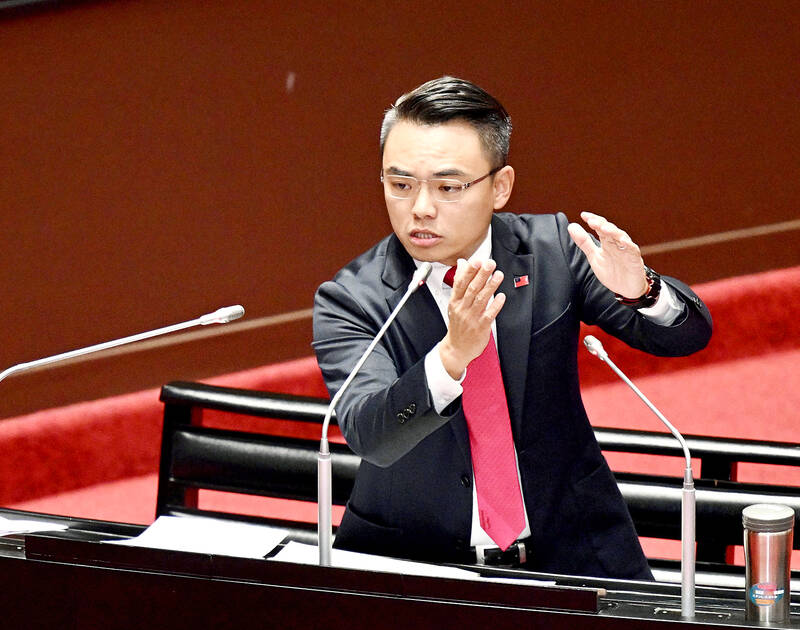Chinese Nationalist Party (KMT) Legislator Hung Meng-kai (洪孟楷) last week sparked widespread discussion when he proposed that people convicted of fraud be caned as punishment.
Hung in a Facebook post that started with “Singapore can. Can Taiwan?” cited a Straits Times report as saying that the Singaporean government plans to expand the use of caning as a punishment to scammers and scam mules.
Despite scammers already facing fines and a maximum of 10 years in prison in Singapore, fraud cases have continued to rise, prompting authorities to seek a more effective deterrent, Hung said.

Photo: Lo Pei-de, Taipei Times
Under the proposed law, scam mules in Singapore could face discretionary caning of up to 12 strokes, while members and recruiters of fraud syndicates could face up to 24 strokes, he said.
Taiwan has long failed to stamp out crimes such as fraud and drunk driving, even with steadily increasing penalties, leading some “academics and members of the public” to propose adopting Singapore’s caning system, he said.
Hung said he would suggest holding legislative exchanges with Singapore, similar to his trip to Japan with Legislative Speaker Han Kuo-yu (韓國瑜) to meet with Japanese lawmakers, to gain a “first-hand understanding” of how the caning system works.
Hung’s post garnered an enthusiastic response, racking up more than 100,000 likes and 24,000 comments as of yesterday, with many people calling for other criminals, such as child or animal abusers, to also be caned.
A number of public figures in Taiwan also weighed in on the subject, such as influencer Cheng Tsai-wei (鄭才暐), also known as “Cheap,” who said that Singapore is able to maintain its caning system for a variety of reasons, including its unique role as an international finance and shipping hub, and its relative insulation against international pressure.
Although Taiwan has some international leverage due to its prominence in chipmaking and high levels of support for capital punishment, the government has adopted the International Covenant on Civil and Political Rights, which prohibits corporal punishment, he said.
Democratic Progressive Party Legislator Chuang Jui-hsiung (莊瑞雄) said that the idea would be a “step backwards” for human rights in Taiwan.
Caning criminals would draw international condemnation and serves no rehabilitative purpose, Chuang said, suggesting more “reasonable” ways to combat fraud, such as increasing penalties or making it more difficult for scammers to be granted parole.
According to the Singapore Legal Advice Web site, judicial caning is applicable to more than 30 offenses under the Singaporean Penal Code, and is mandatory for offenses such as robbery, drug trafficking and vandalism.
Judicial caning can be administered to males aged 18 to 50, and involves up to 24 strokes on the buttocks using a long rattan cane.
Hung did not indicate that he would pursue legislation to enact the caning of scammers into law.

Right-wing political scientist Laura Fernandez on Sunday won Costa Rica’s presidential election by a landslide, after promising to crack down on rising violence linked to the cocaine trade. Fernandez’s nearest rival, economist Alvaro Ramos, conceded defeat as results showed the ruling party far exceeding the threshold of 40 percent needed to avoid a runoff. With 94 percent of polling stations counted, the political heir of outgoing Costa Rican President Rodrigo Chaves had captured 48.3 percent of the vote compared with Ramos’ 33.4 percent, the Supreme Electoral Tribunal said. As soon as the first results were announced, members of Fernandez’s Sovereign People’s Party

MORE RESPONSIBILITY: Draftees would be expected to fight alongside professional soldiers, likely requiring the transformation of some training brigades into combat units The armed forces are to start incorporating new conscripts into combined arms brigades this year to enhance combat readiness, the Executive Yuan’s latest policy report said. The new policy would affect Taiwanese men entering the military for their compulsory service, which was extended to one year under reforms by then-president Tsai Ing-wen (蔡英文) in 2022. The conscripts would be trained to operate machine guns, uncrewed aerial vehicles, anti-tank guided missile launchers and Stinger air defense systems, the report said, adding that the basic training would be lengthened to eight weeks. After basic training, conscripts would be sorted into infantry battalions that would take

GROWING AMBITIONS: The scale and tempo of the operations show that the Strait has become the core theater for China to expand its security interests, the report said Chinese military aircraft incursions around Taiwan have surged nearly 15-fold over the past five years, according to a report released yesterday by the Democratic Progressive Party’s (DPP) Department of China Affairs. Sorties in the Taiwan Strait were previously irregular, totaling 380 in 2020, but have since evolved into routine operations, the report showed. “This demonstrates that the Taiwan Strait has become both the starting point and testing ground for Beijing’s expansionist ambitions,” it said. Driven by military expansionism, China is systematically pursuing actions aimed at altering the regional “status quo,” the department said, adding that Taiwan represents the most critical link in China’s

‘REALLY PROUD’: Nvidia would not be possible without Taiwan, Huang said, adding that TSMC would be increasing its capacity by 100 percent Nvidia Corp CEO Jensen Huang (黃仁勳) on Saturday praised and lightly cajoled his major Taiwanese suppliers to produce more to help power strong demand for artificial intelligence (AI), capping a visit to the country of his birth, where he has been mobbed by adoring fans at every step. Speaking at an impromptu press conference in the rain outside a Taipei restaurant, where he had hosted suppliers for a “trillion-dollar dinner,” named after the market capitalization of those firms attending, Huang said this would be another good year for business. “TSMC needs to work very hard this year because I need a lot